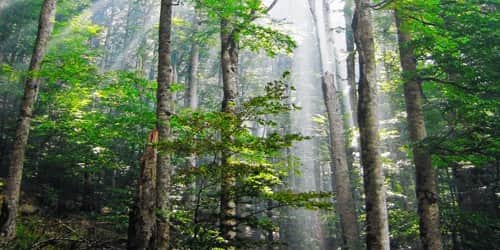Importance of Forest Regions for the Conservation of Environment and maintaining the Ecological Balance
Plants, animals, water, light, air. temperature and soil etc. are the components of Natural Environment. These Factors collectively form the natural environment of a particular region. From the beginning, the Almighty Creator has established a balance in these elements. Any single notable change in any element of nature of any particular area affects the established balance among the total elements. Ultimately it causes the adverse reaction to the environment as a whole. As a. result. the natural environment is destroyed and gradually it becomes inhabitable. The flora, particularly the forest of a region or of a country plays a direct role in maintaining the natural environment and protecting a balance because the plants are the Primary Producer.
For example, if there is no plant in any water reservoir (or marshy land), then no fish will survive there and in absence of fish, the fish-dependent cranes, other birds and snakes will not be able to live there. If the forests of an area are destroyed, the water holding capacity of soil will be decreased rainfall will be less, degradation of land will increase, rivers will be silted up, and in the rainy season, the area will be flooded easily. And due to the lowering of the water level in the dry season draught will appear.
The yield of crops will decrease and deficiency will increase. Again all the inhabiting animals, birds, frogs, snakes will perish or they will come to the cropland or locality in search of food. If the number of plants is decreased the amount of CO2 will increase in the atmosphere and the natural balance will be destroyed. So for leading a normal healthy life for ourselves and our next generation, we shall have to give adequate protection to our present forest resources and raise more and more forests and fruit trees to increase the plant resources according to the additional demand of the growing population.
In statics, approximately fifty countries have more than half of their total land area under forests, and 11 of these have more than 75 percent of their total land area under forests, on the other end sixty-four countries have less than 10 percent of their total land area enclosed by forests. Seven countries of these have no forest land at all, and additional 57 have forests on less than 10 percent of their total land area.
Forests sustain ecological balance in the following ways:
- Forest provides an environment for diverse plants and animals. They help in cleaning the environment, maintains micro-climate and water cycle of an area. The world’s forests hold significance for all of their inhabitants as well as for the general health of the planet.
- They help to avert soil attrition and decompose of plants or its parts replenish the soil with nutrients. They preserve an appropriate equilibrium of oxygen and carbon dioxide in the atmosphere.
- They also present a variety of raw materials such as timber, wood etc and provides food inhabitants and nearby peoples.
- Forests have a significant ecological utility in fixing and storing carbon from the atmosphere.
- The benefits of forests to society and to the mixture of life make it essential that they are sheltered from deforestation and other possible harmful impacts of civilization.












